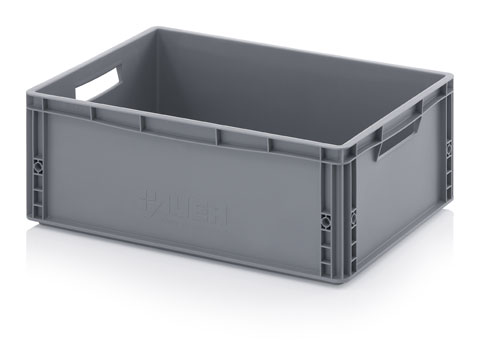Using Plastic Pallets To Minimise Food Waste
27 Aug 2018
Every year, it’s estimated that the EU wastes 89m tonnes of food, with the UK being the worst offender and our supermarkets accounting for 200,000 tonnes of waste alone. As a result, there is increasing public awareness of the food we waste and increasing consumer demand that companies do more to minimise food going into landfill.
So if you’re a company that transports or stores food, now might be a good time to consider switching to plastic pallets for shipping, as they can go a long way to helping you minimise food waste, which could improve your public image and save you money in the long run.

Temperature Changes
When you are storing and transporting fresh or frozen food, your products will need to be kept in cool or cold conditions. Once they’ve been transferred to a store or warehouse, the pallets they were transported on are more likely than not going to be removed from cold storage and will return to room temperature until they are next needed.
When you expose wooden pallets to temperature changes, especially the extreme fluctuations you might see when transporting frozen food, they are susceptible to warping or splintering. This, in turn, puts the food that they are carrying at risk of being damaged by dropping or contamination, costing you or your customers money. These risks are reduced when using plastic pallets for shipping, as plastic is more resistant to temperature changes.
Condensation
When you use wooden pallets to ship food items, you risk their being damaged by condensation, or container rain. Container rain occurs when wood pallets are left in metal shipping crates. The additional heat causes the water in the wood to evaporate, leading to condensation forming on the sides and roof of the shipping container. This condensation then falls like rain on to the produce, which can then rot or develop mould – with one piece of damaged produce contaminating an entire pallet. Plastic pallets don’t have the same problems as wooden pallets, so by using them you avoid container rain and more of your produce survives the transportation process.
Infestations
Because wood is a natural product, you must be very careful as to its origin and how it’s been treated. Untreated wood may not be allowed into some countries – Australia, for example – because of the risk of insect infestation, as eggs can be laid in wooden pallets that have not been treated (considered a biohazard). Even if you are transporting goods in the UK, the last thing you want to risk is insects invading your produce, causing damage to the food, and potentially costing you a lot of money. Again, this risk is removed with plastic, which is safer, more hygienic and more likely to be accepted if transporting food across borders.
Durability
Perhaps unsurprisingly, the final reason to use plastic pallets for shipping is their lifespan, which is approximately 42% longer than that of wooden pallets and could potentially half your costs long-term, making them well worth the investment.
